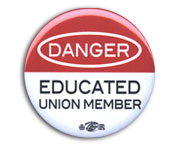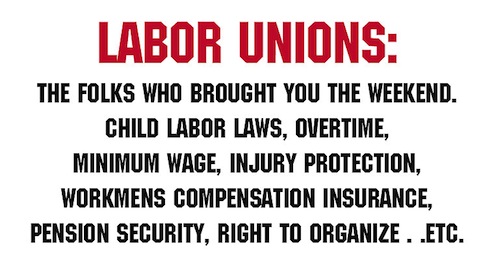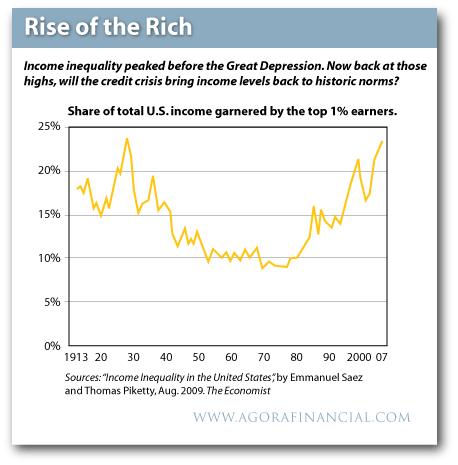Assignment Six:
Wages, Labor & Unions

Since most people do not marry for wealth, or inherit vast sums of money, they must work for a living. Even if you inherit or marry money, social pressure will likely force you to keep working. Yes, the road to wealth usually involves working, saving, and investing. However, illegal activities are all around us waiting, but they often have bad results (prison or death). Therefore, the vast majority of citizens decide that honest work is the road to financial independence.
Individual workers can be compensated in several ways. They may get paid with money or fringe benefits such as paid health insurance, pension plans, vacation time, food, car, clothing allowance, holiday bonus, company stock, a holiday party, etc. Individual workers may get paid by the hour, flat salary, year end bonus, company stock, and sales commissions. If workers don't like the offer, they leave or negotiate.
But about 12% of the workers in the United States belong to a labor union where the workers collectively negotiate with their employer over wages, hours, and working conditions that apply to all employees covered under the union contract or bargaining agreement.
There are two types of unions - ones for private workers who engage in a specific insudtry - say steel workers or plumbers - and unions for "public emplyees" like police, fire personnel, public school teachers, public nurses and the like.
Our country, and especially the state of Wisconsin, is embroiled in the role of unions and, consequently the rights of workers. We will look at his issue more carefully below.
Here are some basic terms:
- CEO - Chief Executive Officer of a corporation
- Blue collar workers - generally perform physical work, such as mechanics
- White collar workers - generally work in offices and usually have college degrees
- Pink collar workers - generally lower paid clerical or office workers (often women)
- Gross pay - total income before taxes and deductions
- Net pay - total pay after all deductions
- Pension - money paid regularly to a person after they retire, provided that the employer has been contributing money for many years and the employee is "vested", meaning that they have worked long enough to qualify for a pension.
- 401K Plan - an employer sponsored tax-deferred (taxes aren't;t paid until money is taken out meaning you earn interest on it until then) retirement plan
- Labor union - a recognized third party bargaining unit that represents employees
- AFL-CIO - The umbrella organization that represents millions of workers who belong to smaller unions, or "locals"
- Social security - mandatory social insurance that covers retires, survivor's, and person's with disabilities
Please read "Slim Pickings Even for Least-Picky Factories" located in our readings section.
1. In a few sentences please describe the type of worker this company is seeking.
2. What are "soft skills?"
3. Why does this company have a hard time finding and retaining workers?
Above you read about the basic requirements companies are looking for in workers, but I know that, because you are in this class, you want and are capable of even more! So please click around on the interactive graphic at this site.
4. What is the difference (subtraction) in an annual salary between a person without a high school diploma and one with a Bachelor's (4-year) degree?
Yes, these are averages and some individuals "beat the odds," but most do not. Also, more and more jobs, in fact now 80%, don't require a Bachelor's degree. We joke here at MATC that we're the largest graduate school in Wisconsin because more than 5,000 students come to us each year already with a four-year degree but unable to find a job.
Please read "10 Highly Profitable 2-Year Degree Jobs" from our readings section (there might be some discrepancies because I combined several sources).
5. What are some of the advantages of earning a two-year degree as opposed to a traditional four-year Bachelor's degree?
6. Pick which of the 10 occupational areas fits you best and explain why you chose it. (I even included MATC's graduate placement report so you can see those titles and how much graduates earned! Pick one of these if the first ten don't suit you.)
Sold on MATC yet? With over 200 programs and occupational areas, and over 400 transfer agreements with other colleges and universities for those who want to go on to a four-year degree, MATC really deserves your consideration. (See my recruiting video here and video on transfer agreements here :)
I know - college isn't right for everyone - at least not right away. So investigate this site and consider an apprenticeship.
Labor Unions are organized groups of employed workers who have established an  organization that bargains (talks, negotiates) with the boss (employer, management) about wages, hours and working conditions for all members of the union. Labor unions have the following goals:
organization that bargains (talks, negotiates) with the boss (employer, management) about wages, hours and working conditions for all members of the union. Labor unions have the following goals:
- Raise wages and benefits above the supply and demand equilibrium.
- Negotiate better hours and working conditions for its members.
- Organize non-union workers into unions in an attempt to bargain for contracts which cover the entire industry. (trucking, grocery stores, construction, etc...)
- Influence government and the laws which impact the lives of working Americans. (Minimum wage laws for example)
Labor unions in the United States reached their peak of power in the 1950s and 1960s as the post WWII industrial economy had little competition from other nations. Since the 1970s, labor unions have declined in their importance and influence as only 12% of the labor force is now covered by a union contract. Only 8% of workers employed in the private sector (non-government which includes municipal workers and public school teachers) are covered by labor union contracts.
But unions are important to everyone as this video illustrates:
7. What does Ed's favorite chart tell us?
Anyone living in Wisconsin certainly should see and understand the outcry from those trying to protect union rights, as well as those who support the governor. What you need to figure out is what is best for you and where you stand in all of this.
Robert Reich is a professor of economics and has advised presidents. In this next short video he tries to explain things - listen for the term "divide and conquer."
8. What does Robert Reich mean by "divide and conquer," in other words, what does he think is going on?
9. According to Reich, what's the "big story?" Hint: Look at that big chart!)
10. What are Americans starting to wake up to?
O.K. Now it'll be your turn - you have a discussion board assignment asking you for your stand on unions. Feel free to challenge anything that's been presented, but do so with credible evidence.
